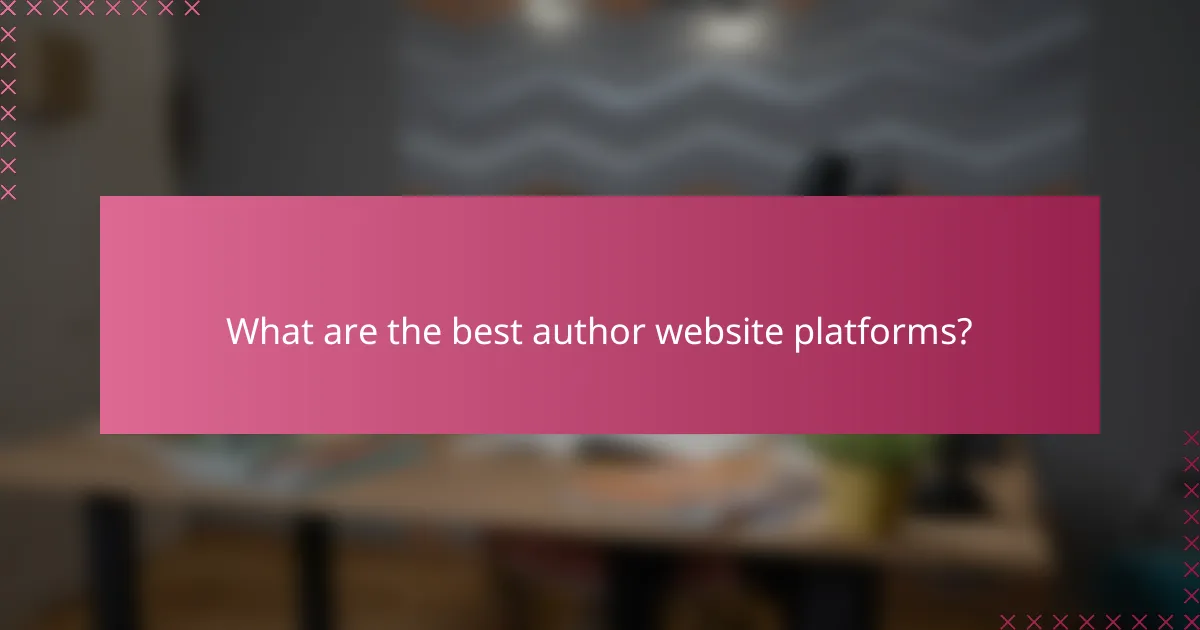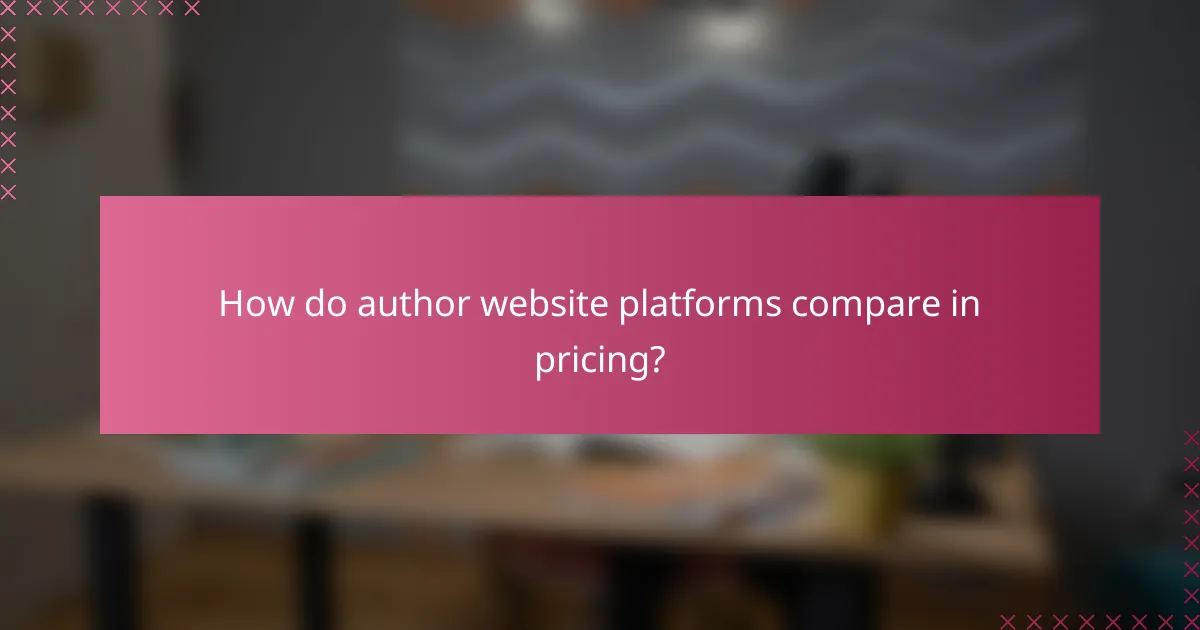Choosing the right author website platform is crucial for effectively showcasing your work and engaging with your audience. Each platform, such as WordPress, Wix, and Squarespace, offers distinct advantages and disadvantages, including ease of use, customization options, and potential costs. Understanding these factors will help you make an informed decision that aligns with your goals as a writer.

What are the best author website platforms?
The best author website platforms offer a balance of ease of use, customization, and functionality tailored for writers. Popular options include WordPress, Wix, Squarespace, Weebly, and Ghost, each with unique features that cater to different needs and preferences.
WordPress
WordPress is a highly versatile platform that powers a significant portion of the web. It offers thousands of themes and plugins, allowing authors to create a customized site that fits their branding and functionality needs.
Consider whether you want a self-hosted site (WordPress.org) for greater control or a hosted option (WordPress.com) for simplicity. Self-hosted sites may require more technical knowledge but offer more flexibility in design and features.
Wix
Wix is known for its user-friendly drag-and-drop interface, making it easy for authors to build a visually appealing website without coding skills. It offers a variety of templates specifically designed for writers and creatives.
Wix also provides built-in SEO tools and marketing features, which can help authors promote their work. However, be aware that some advanced features may require a premium plan.
Squarespace
Squarespace is recognized for its sleek, modern templates that are particularly appealing to visual storytellers. It offers an all-in-one solution with hosting, design, and e-commerce capabilities integrated into one platform.
While Squarespace is easy to use, it may have a steeper learning curve for those looking to customize beyond the provided templates. Pricing is typically higher than some competitors, but it includes robust support and features.
Weebly
Weebly is another user-friendly platform that allows authors to create a website quickly. It offers a straightforward drag-and-drop builder and various templates suitable for showcasing writing portfolios.
Weebly is particularly cost-effective for new authors, with a free plan available. However, it may lack some advanced features and customization options found in other platforms.
Ghost
Ghost is a platform designed specifically for writers and bloggers, focusing on content creation and publishing. It offers a clean, minimalist interface that emphasizes writing without distractions.
Ghost is ideal for authors who prioritize blogging and want a fast, streamlined experience. However, it may require some technical knowledge for self-hosting, and its pricing can be higher for premium features compared to other platforms.

What are the pros of using an author website platform?
Using an author website platform offers numerous advantages, including enhanced visibility, professional presentation, and streamlined content management. These platforms provide tools tailored for authors to showcase their work effectively and engage with their audience.
Customizable design options
Author website platforms typically offer a variety of customizable design options, allowing you to create a unique online presence that reflects your personal brand. You can choose from different templates, color schemes, and layouts to match your style and genre.
When selecting a design, consider how it aligns with your target audience. For instance, a sleek, modern design may appeal to a tech-savvy audience, while a more traditional look might resonate with readers of historical fiction.
SEO-friendly features
Many author website platforms come with built-in SEO-friendly features that help improve your site’s visibility in search engine results. These features may include customizable meta tags, alt text for images, and mobile optimization.
To maximize your SEO efforts, regularly update your content with relevant keywords and create blog posts related to your books. This can help attract organic traffic and establish you as an authority in your niche.
Ease of use
Most author website platforms are designed with user-friendliness in mind, enabling authors to build and manage their sites without extensive technical knowledge. Drag-and-drop editors and intuitive interfaces simplify the process of adding content and making updates.
Even if you have limited experience, you can quickly learn to navigate these platforms. Take advantage of tutorials and customer support to help you get started and troubleshoot any issues.
Integration with social media
Author website platforms often provide seamless integration with social media channels, allowing you to promote your work and connect with readers easily. You can link your social media accounts, share updates, and even embed feeds directly on your site.
Utilizing social media integration can enhance your marketing efforts. Regularly share content from your website on platforms like Twitter, Facebook, and Instagram to drive traffic and engage with your audience effectively.

What are the cons of using an author website platform?
Using an author website platform can come with several drawbacks that authors should consider. These include ongoing costs, limited control over hosting, and a potential learning curve for advanced features.
Monthly subscription costs
Many author website platforms operate on a subscription model, which can lead to ongoing monthly expenses. Depending on the features and services included, these costs can range from low tens of USD to higher amounts for premium options. Authors should evaluate their budget and determine if the investment aligns with their goals.
It’s essential to consider not just the base subscription fee but also any additional costs for custom domains, extra storage, or advanced features. Over time, these expenses can add up, making it crucial to weigh the benefits against the financial commitment.
Limited control over hosting
When using an author website platform, control over hosting is often restricted. This means that authors may not have the ability to customize server settings or choose their hosting provider. Such limitations can affect website performance, security, and scalability.
Authors should be aware that if the platform experiences downtime or technical issues, their website may be impacted without recourse to resolve the situation independently. This lack of control can be a significant drawback for those who prioritize reliability and customization.
Learning curve for advanced features
Many author website platforms offer advanced features that can enhance functionality, but these often come with a learning curve. Authors may find themselves spending time learning how to effectively use these tools, which can detract from their writing and creative processes.
To mitigate this challenge, authors should look for platforms that provide comprehensive tutorials, customer support, or community forums. Investing time in understanding these features can ultimately lead to a more effective website, but it requires a commitment to learning and adaptation.

What key considerations should authors keep in mind?
Authors should consider their target audience, content management needs, and potential for future growth when choosing a website platform. These factors will influence not only the website’s design and functionality but also its effectiveness in reaching readers and promoting their work.
Target audience needs
Understanding the target audience is crucial for authors when selecting a website platform. Consider what features your readers value, such as easy navigation, mobile compatibility, and access to multimedia content. Tailoring the website to meet these needs can enhance user experience and engagement.
For example, if your audience primarily consists of young adults, a visually appealing design with social media integration may be more effective. Conversely, if your readers are academics, a clean layout with easy access to research materials might be preferred.
Content management capabilities
Content management is a vital aspect of maintaining an author website. Choose a platform that allows for easy updates, organization of posts, and integration of various media types. Popular options like WordPress and Squarespace offer user-friendly interfaces that simplify content management.
Evaluate whether the platform supports features such as scheduling posts, categorizing content, and adding plugins for enhanced functionality. This will save time and effort in keeping your website current and relevant.
Scalability for future growth
Scalability is essential for authors planning to expand their online presence. Select a platform that can accommodate increased traffic and additional features as your audience grows. This might include options for e-commerce, membership areas, or advanced analytics.
Consider platforms that offer flexible pricing plans and the ability to upgrade easily. This ensures that as your needs evolve, your website can adapt without requiring a complete overhaul, saving both time and resources in the long run.

How do author website platforms compare in pricing?
Author website platforms vary significantly in pricing, often depending on features, customization options, and hosting services. Basic plans may start at low monthly fees, while premium options can reach higher price points based on additional functionalities and support.
WordPress pricing tiers
WordPress offers various pricing tiers that cater to different needs and budgets. The free version provides basic functionality, but many authors opt for paid plans that range from approximately $4 to $45 per month, depending on features such as custom domains, storage, and support.
For authors looking for more control and customization, self-hosted WordPress.org can be a cost-effective solution. While the software itself is free, authors will need to budget for hosting services, which can range from $3 to $30 per month, plus domain registration fees that typically cost around $10 to $20 annually.
When selecting a pricing tier, consider your specific needs, such as e-commerce capabilities or advanced design options. It’s advisable to start with a basic plan and upgrade as your audience grows or your requirements change.
